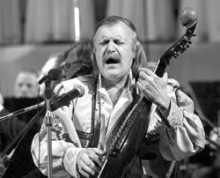A soiree was recently held in Seattle, Washington, to commemorate the 135th anniversary of the birth of the outstanding Ukrainian kobzar Terentii Parkhomenko. Parkhomenko’s pupil, the kobza and lira player Vasyl Nechepa, a Shevchenko Prize winner, performed an extensive concert program.
At the beginning of the last century Parkhomenko was the sole exponent of the tradition of the ancient Chernihiv school of kobza playing. The short life of this blind musician left a very noticeable trace in the art of the kobza. Born in the village of Voloskivtsi, Mena raion, Chernihiv oblast, he became a living legend, following in the footsteps of Andrii Shut and other famed kobzars of the oldest school of kobza playing — Chernihiv.
During his short lifespan — he was barely 39 years when he died — Parkhomenko’s creativity became known in various parts of the world. The composer Mykola Lysenko held him in the highest esteem and helped him organize concerts in Kyiv’s most prestigious halls, particularly at the Philharmonic Society. Parkhomenko also performed during the famous kobzar convention in Kharkiv (1902). The noted bandurist and singer Mykola Domontovych recorded songs and dumas (epic ballads) from the kobzar’s repertoire, which became the nucleus of a kobza self-instruction manual.
Among Parkhomenko’s pupils were such personalities as Petro Tkachenko-Halashko, Ovrama Hreben, and the blind kobzar Demian Symonenko. There was, however, one other pupil whose name would not be mentioned in print for a long time. In 1905, Parkhomenko taught the ancient Cossack technique of kobza playing, known as odbii, to Oleksandr Korniievsky, the future excellent musician, who made kobzas for him. After mastering the technique, in 1906 Korniievsky started developing a new instrument based on the ancient Chernihiv kobza. A new instrument, the chromatic concert bandura, thus appeared in Ukraine a hundred years ago.
Nechepa told the Seattle audience about the difficult life of Parkhomenko and Nechepa’s teacher Korniievsky, whom the Soviet authorities sentenced to more than 24 years in the labor camps for his invention. He performed legendary songs from the renowned kobzar’s repertoire to the accompaniment of his kobza, which Nechepa modeled on Parkhomenko’s legendary instrument and which he has been playing for the past 25 years.
The soiree was organized by the Ukrainian American Club of Washington. The club’s president, Petro Drohomiretsky, presented the kobzar with ears of Ukrainian wheat as a token of gratitude for the concert. The audience, which included both children and adults, greeted him with a lengthy ovation.
After the soiree Nechepa, senior scholarly associate at the Institute of Ukrainian Studies and the only exponent of the ancient Chernihiv school of kobza playing, left on a tour of US cities, where he will be performing a concert program entitled “The History of the Ancient State of Ukraine through Its Songs.”







